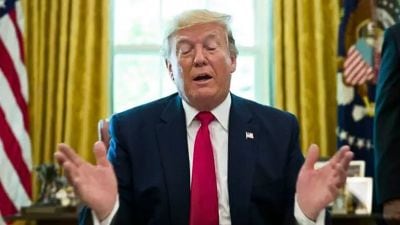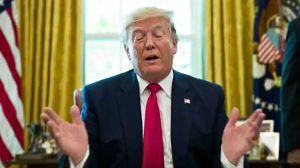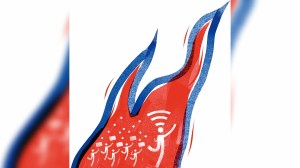A plane crash in Kazakhstan, another impeachment in South Korea and a protest against an EU law – the world this week
From 38 people being killed in an Azerbaijan Airlines flight crash and Qatar threatening to halt gas exports to the EU to Donald Trump’s former attorney general pick being accused of misconduct, a lot has happened in the world this week.
 Emergency specialists work at the crash site of an Azerbaijan Airlines' Embraer passenger plane near the city of Aktau, Kazakhstan; Protesters attend a rally against South Korea's impeached President Yoon Suk Yeol, who declared martial law, which was reversed hours later, in Seoul. (AP Photos)
Emergency specialists work at the crash site of an Azerbaijan Airlines' Embraer passenger plane near the city of Aktau, Kazakhstan; Protesters attend a rally against South Korea's impeached President Yoon Suk Yeol, who declared martial law, which was reversed hours later, in Seoul. (AP Photos)
Welcome to this week’s roundup of key global events and developments shaping politics, economics, and society. From groundbreaking policy shifts and diplomatic manoeuvres to emerging stories of resilience and upheaval, we bring you the latest updates and insights. For Indian audiences, understanding these developments is not just about keeping informed—it’s about identifying the ripple effects that could influence India’s foreign policy and its position in an increasingly fragmented world.
Whether it’s a headline grabbing the world’s attention or an underreported issue with far-reaching consequences, we aim to provide a clear, concise, and comprehensive overview of what matters most.
The national airlines of Azerbaijan and Kazakhstan have suspended certain flights to Russia following evidence suggesting that a Russian air defence system downed an Azerbaijani aircraft.
Kazakh airline Qazaq Air announced Friday that it had suspended its Astana-to-Yekaterinburg route, according to the Kazinform news agency. Meanwhile, Azerbaijan Airlines halted flights to seven cities in southern Russia.
The suspensions came after an Azerbaijan Airlines flight en route from Baku to Grozny, Russia, was diverted over the Caspian Sea and crash-landed near Aktau, Kazakhstan, on Wednesday, killing 38 people.
Footage of the wreckage revealed multiple puncture marks consistent with anti-aircraft fire. Additionally, there is evidence that Russia was jamming GPS navigation near Grozny at the time, reportedly to counter a potential Ukrainian drone attack.
Azerbaijan’s transport minister, Rashad Nabiyev, stated that evidence collected by Azerbaijani investigators indicated “external interference” with the aircraft. “Injured passengers and surviving crew members reported hearing an explosion over Grozny,” Nabiyev said. He added that video evidence showed injuries sustained by both a flight attendant and a passenger. “Russian citizens aboard also reported hearing three explosions outside the plane, followed by an impact,” he told reporters.
Azerbaijani investigators who examined the aircraft’s fuselage identified damage and shrapnel traces consistent with an external impact.
Qazaq Air announced its suspension of flights to Yekaterinburg until January 27, citing an “ongoing risk assessment” for flights to Russia. Azerbaijan Airlines confirmed the suspension of flights to Grozny and other southern Russian cities.
Russia attributed the incident to heavy fog, claiming the aircraft struck a flock of birds. However, the Kommersant newspaper reported no forecast of heavy fog in Grozny at the time. Russian authorities also pointed to an alleged Ukrainian drone attack, with one drone reportedly shot down near the North Ossetia region.
The crash has drawn parallels to the downing of Malaysia Airlines flight MH17 over Ukraine in 2014, where investigators concluded that a Russian-controlled missile brought down the aircraft, killing all 298 passengers and crew.
Senior US and Ukrainian officials have also implicated a Russian anti-aircraft system in this latest incident. Ukrainian President Volodymyr Zelenskyy stated that “clear visual evidence at the crash site points to Russia’s responsibility”. He warned that if Moscow perpetuates false narratives as it did following the MH17 tragedy, the international community must respond decisively.
South Korean acting president impeached
South Korea’s Opposition-controlled Parliament impeached the acting president, deepening the country’s political turmoil.
Lawmakers approved a motion to impeach Han Duck-soo, who also serves as prime minister, after he resisted calls to appoint three justices to fill vacancies on the constitutional court.
This marks the first time an acting president has been impeached in South Korea’s history and follows the suspension of President Yoon Suk Yeol less than two weeks ago. Yoon’s suspension came after his controversial attempt to impose martial law, which unsettled the nation.
Finance Minister Choi Sang-mok has now assumed the acting presidency, making him the third leader in under a month. Choi urged the military to heighten vigilance, cautioning that North Korea might exploit the country’s political instability. “Minimising national chaos is critical. I will do my utmost to stabilise state affairs,” he said.
The developments coincide with the constitutional court’s hearings on Yoon’s impeachment over his attempt to reinstate military rule. The court has six months to decide whether to uphold Yoon’s impeachment or reinstate him.
The political crisis occurs at a precarious economic moment, with slowing export growth and anticipation of higher tariffs when Donald Trump takes office as US president next month. The South Korean won fell 0.5 per cent against the dollar this week, hitting its weakest level since 2009, while the Kospi stock index dropped 1 per cent amid heavy foreign sell-offs.
“There is legal uncertainty about the conditions required to impeach an acting president, but this move could undermine confidence in the economy’s external credibility,” said Shin Yul, a politics professor at Myongji University in Seoul.
Impeaching the prime minister requires a simple parliamentary majority, but the ruling party contested the vote’s validity, filing an injunction and arguing that the two-thirds majority required for impeaching a president should also apply to acting presidents.
Han Duck-soo stated he respected Parliament’s decision and would await the constitutional court’s ruling on the matter. Lee Jae-myung, leader of the opposition Democratic Party, accused Han of “acting for insurrection.”
Han, a career bureaucrat appointed by Yoon, had refused to approve the appointments of three justices to the nine-member court, insisting on a bipartisan agreement. This week, Yoon’s conservative People Power Party boycotted Opposition-led votes on the judicial appointments.
The constitutional court currently has only six justices, while seven are typically required to consider an impeachment case. At least six votes are needed to remove a president, meaning a single dissenting vote could overturn Yoon’s impeachment. Compounding the uncertainty, the terms of two justices are set to expire in April. However, the court has stated it can proceed with deliberations despite its incomplete bench.
Meanwhile, Yoon, who denies wrongdoing, faces a third summons from the country’s anti-corruption agency to address charges of treason and abuse of power.
Trump’s former attorney general pick accused of misconduct
Matt Gaetz, a former close ally of Donald Trump and his initial choice for US attorney general, has been accused by the House Ethics Committee of engaging in sexual misconduct, including having sex with a minor, paying for sex, and using illegal drugs, according to a report released Monday.
The committee found “substantial evidence” that the former Republican congressman violated House rules as well as state and federal laws. “The Committee determined there is substantial evidence that Representative Gaetz violated House rules and other standards of conduct prohibiting prostitution, statutory rape, illicit drug use, impermissible gifts, special favors or privileges, and obstruction of Congress,” the report stated.
Gaetz, a staunch Trump supporter and potential future candidate for Florida governor or senator, has denied any wrongdoing. He posted on X that he was not charged after a prior Department of Justice investigation into allegations of sexual misconduct.
Last week, he wrote: “It’s embarrassing, though not criminal, that I probably partied, womanized, drank, and smoked more than I should have earlier in life. I live a different life now.”
The 42-year-old Florida Republican sparked controversy in November when president-elect Trump tapped him for attorney general despite his limited legal experience. The announcement caused a stir in Washington. Gaetz withdrew his candidacy days later, citing concerns that his nomination had become “a distraction to the critical work of the Trump/Vance transition,” referring to J D Vance, Trump’s vice-presidential pick. Trump subsequently nominated former Florida attorney general Pam Bondi for the role.
The Ethics Committee’s report alleges that between 2017 and 2020, Gaetz paid tens of thousands of dollars to women for activities “likely connected to sexual activity and/or drug use.” In one instance, Gaetz allegedly paid a 17-year-old for sex at a party in 2017. The report claims she had just completed her junior year of high school and was under the influence of Ecstasy during her encounters with Gaetz. The committee noted, however, that there was no evidence Gaetz knew she was a minor.
Qatar protests EU law
Qatar has warned it may halt critical gas exports to the European Union if member states enforce new legislation imposing penalties on companies failing to meet standards on carbon emissions, human rights, and labour practices.
Qatari Energy Minister Saad Al-Kaabi told the Financial Times that if EU countries imposed penalties under the corporate due diligence directive, Doha would cease exporting liquefied natural gas (LNG) to the bloc. The directive mandates fines of at least 5 per cent of a company’s annual global revenue for non-compliance.
“If I lose 5 per cent of my revenue by supplying Europe, I will not go to Europe. I’m not bluffing,” Al-Kaabi said. “This is the people’s money, and no one would accept losing such a significant amount.”
Adopted in May, the directive is part of the EU’s broader effort to achieve net-zero emissions by 2050 but has faced pushback from companies both inside and outside Europe, citing excessive burdens and competitive disadvantages. Industry body Cefic criticised the rules for creating “significant litigation risks” and called for simplification to reduce liability exposure. Non-EU companies earning over €450 million in net turnover within the bloc would also be subject to penalties.
Qatar, a leading LNG exporter, has become increasingly vital to Europe’s energy supply following disruptions caused by Russia’s invasion of Ukraine. Al-Kaabi, who also serves as CEO of state-owned QatarEnergy, argued that the legislation would be impractical for a company of its scale. He noted it would require QatarEnergy to conduct due diligence on the labour practices of all its suppliers, a network involving 100,000 companies globally.
Al-Kaabi further contended that aligning with the EU’s net-zero target is unrealistic for a hydrocarbon producer like QatarEnergy. The directive obliges large companies to adopt transition plans consistent with the EU’s 2050 climate neutrality goal under the Paris Agreement, along with intermediate targets under European Climate Law.
The legislation could impact all Qatari exports to Europe, including fertilizers and petrochemicals, and might influence the investment strategies of the Qatar Investment Authority, the country’s sovereign wealth fund. While Al-Kaabi pledged not to break LNG contracts, he hinted at exploring legal options if faced with steep penalties.
“I will not accept being penalised,” he said, adding, “I will stop sending gas to Europe.” However, he indicated a willingness to negotiate if penalties were limited to revenue generated in Europe rather than total global earnings.
European Commission President Ursula von der Leyen recently proposed streamlining reporting requirements across the bloc’s green finance laws, including the due diligence directive, as part of efforts to ease regulatory burdens.
Photos





- 01
- 02
- 03
- 04
- 05


























